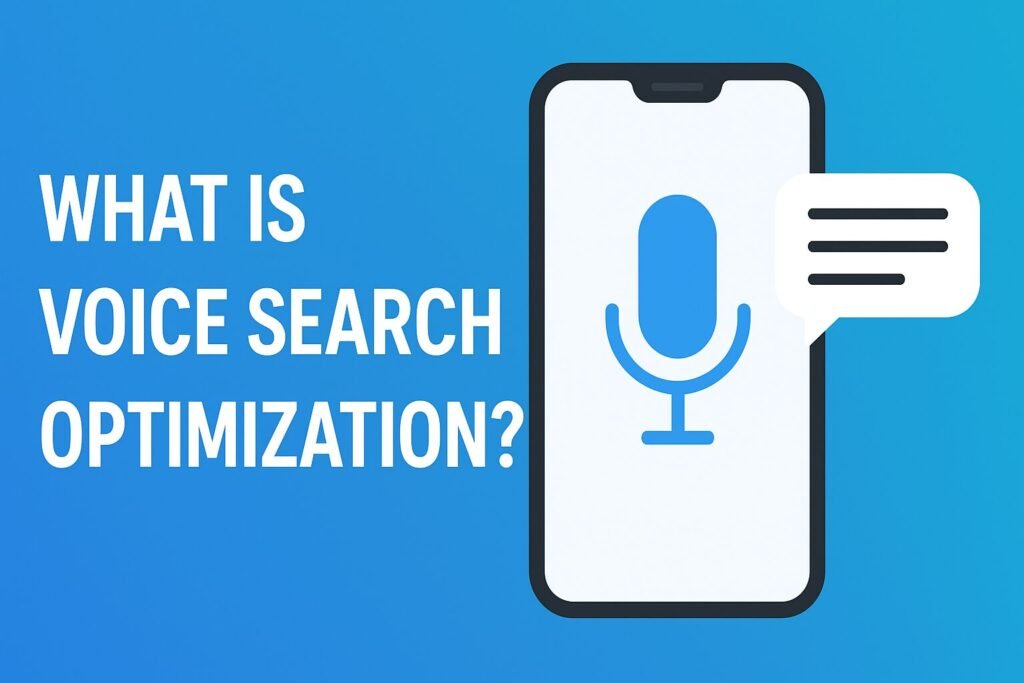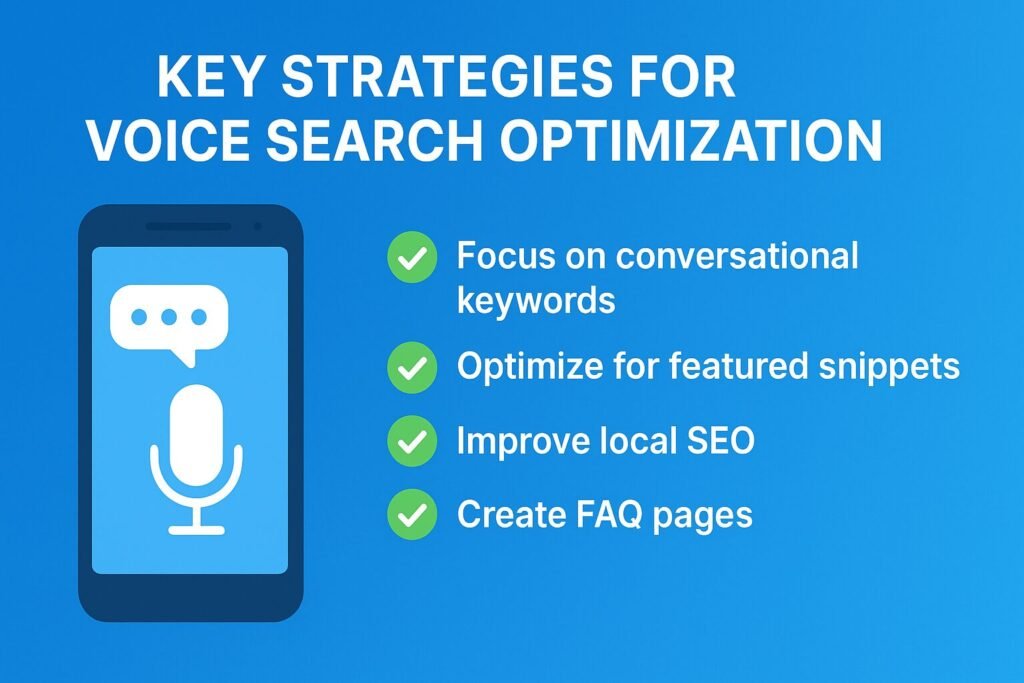The world of search has evolved dramatically. From the early days of typing a few keywords into a search bar to today’s AI-driven digital experiences, search behavior has changed at lightning speed. Mobile optimization, local SEO, and content-driven strategies dominated the last decade. But now, voice search optimization is reshaping the digital marketing landscape.
According to WebFX, Voice search optimization is the process of optimizing website content to rank higher in search results when users ask questions using voice commands on devices like smartphones or smart speakers.
With the rise of smart speakers such as Amazon Alexa, Google Home, Apple’s Siri, and voice-enabled smartphone apps, millions of users are shifting to voice queries instead of typing. For businesses, this isn’t just another SEO trend—it’s a massive opportunity to reach customers in a more natural, conversational way.
Brands that adapt to this shift will enjoy better visibility, more traffic, and stronger conversions. Those that ignore it risk falling behind.
This comprehensive guide will explore what voice search optimization is, why it’s the future of SEO, and how you can implement strategies to make your website ready for 2025 and beyond.
What is Voice Search Optimization?

Voice search optimization is the process of optimizing your website so it ranks for spoken queries made through devices like smartphones, smart speakers, or AI-powered voice assistants.
Unlike traditional searches where users type short phrases such as “best hotels Delhi”, voice queries are more natural and conversational. For example, a user might say:
👉 “Hey Google, what are the best hotels near India Gate?”
This small shift in query style completely changes the way businesses should approach SEO.
Key characteristics of voice search:
- Conversational – Users ask full questions instead of keywords.
- Faster – Speaking is quicker than typing.
- Local-focused – Many queries are about nearby services (“near me” searches).
- Hands-free – Useful while driving, cooking, or multitasking.
Why Voice Search is the Future of SEO
1. Explosive Growth of Voice Devices
More than half of households worldwide now own a smart speaker, and billions of smartphones come preloaded with Google Assistant, Siri, or Alexa. This adoption ensures that voice search will only expand further.
2. Mobile-First World
Most internet activity happens on mobile devices, where voice input feels faster and easier than typing. With 5G and AI-powered responses, voice commands are becoming the default.
3. Advances in Natural Language Processing (NLP)
Google’s BERT and MUM algorithms are designed to interpret context and intent in human speech. This makes results for voice queries far more accurate than ever before.
4. The Power of Local Searches
Voice search is heavily tied to location. Phrases like “restaurants near me” or “nearest petrol station” dominate voice search queries—making local SEO critical.
5. Accessibility & Convenience
Voice search is inclusive. From visually impaired users to multitaskers, voice input provides an effortless way to interact with technology.
How Voice Search Differs from Traditional Search
| Traditional Search | Voice Search |
|---|---|
| Short keywords: “SEO tips” | Full questions: “What are the best SEO tips for beginners?” |
| Text-based | Conversational & question-based |
| Performed on desktop or mobile typing | Done through smartphones & smart speakers |
| Shows 10+ blue links | Usually returns one or two spoken answers |
| Keyword-focused optimization | Conversational, context-based optimization |
Here is an HTML View for this table so that you can share it with your friends:
| 🔍 Traditional Search | 🎤 Voice Search |
|---|---|
| Short keywords: “SEO tips” | Full questions: “What are the best SEO tips for beginners?” |
| Text-based queries | Conversational & question-based |
| Typed on desktop or mobile | Asked via smartphones & smart speakers |
| 10+ blue links shown | Usually 1–2 spoken answers |
| Optimized with keywords | Optimized with natural speech & context |
Key Strategies for Voice Search Optimization

1. Focus on Conversational Keywords
Users don’t say “cheap hotels Jaipur”. They ask, “What are the cheapest hotels in Jaipur near the station?”
👉 Use long-tail, question-based keywords.
👉 Tools like AnswerThePublic, Google People Also Ask, and Semrush Keyword Magic Tool can uncover conversational phrases.
2. Optimize for Featured Snippets (“Position Zero”)
Most voice answers are read directly from Google’s featured snippets.
- Use clear headings.
- Provide concise answers in 40–50 words.
- Use bullet points and numbered lists for easy extraction.
3. Strengthen Local SEO
- Claim and verify your Google Business Profile.
- Use local keywords (“best dentist in Jaipur”).
- Maintain NAP (Name, Address, Phone) consistency.
- Collect positive reviews to build trust.
4. Improve Page Speed
Voice assistants prefer fast-loading websites.
- Compress images and enable caching.
- Use a CDN (Content Delivery Network).
- Switch to mobile-first responsive design.
5. Create Detailed FAQ Pages
Most voice searches are questions. FAQ sections mimic natural queries, making them perfect for voice SEO.
Example:
- Q: “How can I reduce electricity bills at home?”
- A: “You can reduce bills by switching to LED bulbs, using energy-efficient appliances, and turning off devices when not in use.”
6. Use Schema Markup (Structured Data)
Schema markup helps Google understand your content better. Add schema for:
- Local businesses
- Recipes
- Events
- Products & reviews
7. Enhance Mobile Experience
Since 70%+ of voice searches happen on mobile, your website must pass Google’s Mobile-Friendly Test.
Industries That Benefit the Most from Voice Search

While voice SEO helps every business, some sectors see extraordinary benefits:
- Restaurants & Cafes – “Where’s the best pizza place near me?”
- Healthcare – “What are the early symptoms of diabetes?”
- E-commerce – “Alexa, order me a phone charger.”
- Travel & Hospitality – “Find budget hotels in Jaipur.”
- Education & Training – “What are the best online digital marketing courses?”
Common Mistakes to Avoid in Voice Search Optimization
❌ Overusing keywords → Content must sound natural.
❌ Ignoring local SEO → Misses “near me” searches.
❌ Slow-loading websites → Voice assistants won’t select laggy sites.
❌ Outdated Google Business Profile → Results in lost customers.
❌ Skipping schema markup → Limits chances of ranking in voice results.
The Future of Voice Search in SEO
- Voice Shopping Will Rise – By 2026, voice-driven eCommerce sales will be worth billions.
- Expansion into Local Dialects – NLP will soon understand regional languages & accents, opening opportunities in India and beyond.
- Voice + Visual Search – Devices may combine voice commands with AR/visual search.
- Hyper-Personalization – Voice assistants will offer answers tailored to individual users based on habits, location, and preferences.
If you want to check How you can improve your keyword research, We have an article for that, check it here.
Conclusion
Voice search isn’t a trend—it’s the next era of SEO. As users shift from typing to speaking, businesses must adapt to stay relevant.
By focusing on conversational keywords, local SEO, featured snippets, site speed, and schema markup, you’ll position your brand to win in the age of voice search.
Remember, voice SEO is about understanding how people talk—not how they type. If you optimize for natural language and fast answers, your website will stand out in this evolving landscape.
SEO Checklist for Voice Search Optimization
✅ Use long-tail, conversational keywords
✅ Optimize for featured snippets
✅ Strengthen local SEO & Google Business Profile
✅ Improve website speed
✅ Create FAQ pages
✅ Implement schema markup
✅ Ensure mobile responsiveness
By implementing these strategies, you’re not just optimizing for today—you’re future-proofing your SEO strategy for tomorrow.
Frequently Asked Questions (FAQ) on Voice Search Optimization
Q1. What is voice search optimization in SEO?
Voice search optimization means tailoring your website to rank for spoken queries made via devices like Alexa, Siri, or Google Assistant. It focuses on natural, conversational keywords rather than short, typed ones.
Q2. How is voice search different from traditional search?
Traditional search uses short keywords, while voice search involves full, conversational questions. Voice results often provide just one answer, making optimization more competitive.
Q3. Why is voice search important for businesses?
Voice search boosts local discovery, improves accessibility, and drives higher engagement. Businesses optimized for voice queries often secure more conversions.
Q4. Which industries benefit the most from voice search optimization?
Restaurants, healthcare providers, e-commerce stores, travel agencies, and educational platforms gain the most since users frequently search for these services through voice assistants.
Q5. How can I optimize my website for voice search?
- Use conversational, long-tail keywords
- Optimize for featured snippets
- Add structured data (schema)
- Improve local SEO
- Ensure mobile speed and responsiveness
- Add FAQs for common queries
Q6. Will voice search replace text search?
Not completely. While voice search is growing, text-based search remains vital. The future will likely be a blend of both, depending on user preferences and situations.
Q7. Is schema markup really necessary for voice SEO?
Yes. Schema markup helps search engines better understand and categorize your content, increasing the chances of being selected for voice search answers.




